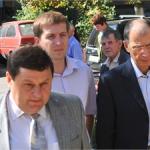Oh bragin. Akhat (Alexander) Khafizovich Bragin: biography Akhat Bragin biography
Akhat Bragin was born on February 26th. Donetsk residents still remember who it is. It’s strange, he always seemed almost an old man to me, but in fact, in the year of his death he was only 42 years old.
At the end of the eighties, active Donetsk residents began to master a new type of activity for society - private entrepreneurship, which was finally allowed in the USSR. As a rule, the business consisted of mediation and trade, but over time, the activities of some entrepreneurs acquired an impressive scale. It is worth remembering some of the most iconic people who began their ascent at that time. The first in this galaxy was Akhat Bragin, a man who, back in Soviet times, was involved in various profitable businesses, for which he was even put on trial in 1971. However, by the end of the eighties, he legalized his business and was considered one of the most successful entrepreneurs in the region. At the same time, evil tongues claimed that the Tatar from the Oktyabrsky village was also a crime boss nicknamed Alik the Greek. However, throughout the USSR, the majority of successful entrepreneurs of the late eighties and early nineties had a reputation as persons associated with crime to one degree or another. At the same time, the deputy director of the Kirovskaya mine, Evgeniy Shcherban, began building his business, and soon became an iconic figure for the region.
Today it is difficult to distinguish fiction from the real biography of Bragin. He was considered a criminal authority, his subordinates were credited with organizing the murders of several competitors, and together with Shcherban he is considered one of the founders of the Industrial Union of Donbass. In 1994-95, several crime bosses died in Donetsk, which, according to some authors, was a consequence of the war between the Bragin and Kushnir groups...
What is known for certain is that under the leadership of Bragin, already in the early 90s, a strong and profitable financial and industrial group was formed, which grew stronger before our eyes, absorbing various markets, firms and enterprises in the region. In August 1994, Bragin also became the owner of the Shakhtar football team, which made him a public figure. Despite the criminal reputation of the entrepreneur, the police have never been able to find facts of violation of the law on the part of Akhat Khafizovich. Moreover, when the city's chief police officer, Arkady Boldovsky, gave an interview in which he accused the entrepreneur of creating a criminal group, he, offended, filed a claim for protection of honor in court and won the case.
The thin and short Tatar seemed indestructible, but on October 15, 1995, during the Shakhtar-Tavriya match, an explosion occurred at the Donetsk stadium, sending Akhat Bragin and his security guard to the next world. The all-powerful businessman was simply torn to pieces, so the body could only be identified by the watch. According to Donetsk journalist Evgeniy Yasenov, “for Donetsk, Bragin’s murder was an outstanding event: it was not just a person who was leaving, but an entire era. His funeral turned out to be appropriate. “It was a terrible sight. I looked from the window of my apartment along Marshal Zhukov Street and saw a huge crowd of people in long leather raincoats moving towards the mosque, with gloomy guards on either side. And all this - in complete silence, only the foliage rustled under their feet and a helicopter quietly murmured in the sky,” one of the residents of the Oktyabrskaya mine village, where Bragin was born and lived, describes the funeral procession.
A year before his death, Bragin allocated money for the construction of the first mosque in the Donetsk region. After his death, it received the name “Akhat-Jami” in memory of its creator. (The mosque was completed and opened in 1999. In 2014, during the battle for the airport, Ukrainian artillery shelled Akhat-Jami, damaging its dome.)
The death of Bragin, Shcherban, Momot and a number of other authoritative businessmen of Donetsk, who laid down their lives in 95-96, opened the way to the Donbass Olympus for new people who had previously been in the shadow of the first wave of entrepreneurs.
Bragin Akhat Khafizovich (aka Alexander Sergeevich Bragin, aka Alik the Greek)
President of the Shakhtar football club (until October 15, 1995), he was at the forefront of creating the largest financial and industrial group in Ukraine, which, after his death, became the main part of Rinat Akhmetov’s business conglomerate.
Bragin was born into a Tatar family on the outskirts of Donetsk near the airport, in the village of Oktyabrsky, Kuibyshevsky district. In his youth, he received the nickname “Alik the Greek.”
BEGINNING OF THE WAR
Nevertheless, for some reason many experts in the fight against organized crime believe that the day of this beginning was March 19, 1994 - then there was an attempt on the life of Alik Grek in the village of Peski, Yasinovatsky district. But, as we already know, the shooting of prominent businessmen and bandits began earlier.
After Bragin refuses financial cooperation to Anatoly Ryabin, the situation becomes especially tense. As Vadim Bolotskikh testified during the investigation, Kushnir and Ryabin believed that Grek’s people also killed their friend, a thief in law nicknamed Chirik (this happened much later). In fact, the group, which later became known as the “Ryabin-Kushnir-Aliev” gang, and even later “the Kushnir gang,” grew up on the ruins of Chirik’s inheritance and gained its fame only because most of the crimes they committed were solved. Having learned that Alik the Greek regularly visits his favorite dovecote in Sands, they decided to remove Bragin there.
In Peski, near the reservoir, there is a children's pulmonology sanatorium. There were no children in the sanatorium at that time, and part of the building was rented for office space by the Lux company (the so-called “old Lux”).
Half an hour before the assassination attempt, three masked machine gunners stopped a white Moskvich driving along Mira Avenue. The raiders did not bother themselves with unnecessary conversations: they threw the driver out of the cabin and drove off in an unknown direction.
In the recreation area, Bragin’s car was ambushed - the exit from the sanatorium was blocked. It was only thanks to a lucky coincidence that Bragin remained alive then - due to unforeseen circumstances, those who were waiting prematurely opened fire from machine guns (according to another version - from pistols with silencers), used a live grenade.
Bragin remained alive - he was saved by pigeons: Alik the Greek took cover from bullets in a dovecote. Two “Lux” employees, who acted as the director’s security guards, died on the spot, four people were seriously injured, one of them, the sanatorium guard, died in the hospital. Bragin was also taken to Hospital No. 21. The doctor on duty reported the incident to the district police department. When the riot police arrived at the hospital, security from Lux was already stationed there. Both the police and Bragin’s people were on duty near the chamber itself.
After leaving the hospital, Alexander Sergeevich, as he was called in the world, moved to live in his office, located in the Donetsk Botanical Garden. His residence was the former Lux Hotel of the Ministry of Coal Industry. The hotel rooms have been visited by many celebrities; members of the government and parliament have stayed in them. While in Donetsk, USSR President Mikhail Gorbachev and his wife Raisa Maksimovna also used the services of Lux. Since 1989, the respectable three-story building became the property of JSC "Lux". Touring Pugacheva, Kirkorov, Kobzon, Anastasia and other pop stars preferred to stay only in the Botanical Garden. “In the “Lux” it’s like in heaven,” Metropolitan Vladimir once remarked, blessing the hotel for many years. The hotel was guarded by the private security company Kodon. It was armed with pump-action shotguns. The territory of the company was carefully guarded; Bragin himself moved around the city exclusively accompanied by reliable security and in an armored Mercedes. The wife and children of the general director lived almost constantly on the territory of the Lux.
I only remember his grand entrance at some building not far from the arbitration court on Chelyuskintsev Street, when a small bulldog first jumped out of an anthracite Mercedes, and then a small, frail man appeared, who immediately disappeared, as if by magic. sticks - it was covered with about five umbrellas, painted to match the gelding. "It's from the snipers on the rooftops." - explained a colleague who is skilled in crime - from the memoirs of the author of the article.
Akhat Khafizovich Bragin(Ukrainian Akhat Khafizovich Bragin, Tat. kht Hafiz uly Bragin); February 26, 1953, Stalino - October 15, 1995, Donetsk;) - crime boss Alik Greek(Ukrainian Alik Grek), president of the Shakhtar football club until October 15, 1995, was at the forefront of the creation of the largest financial and industrial group in Ukraine, which after his death became the main part of Rinat Akhmetov’s business conglomerate
Biography
Akhat Khafizovich Bragin was born into a Tatar family on the outskirts of Stalino near the airport, in the village of Oktyabrsky, Kuibyshevsky district. Brother - Rashid Evgenievich Bragin (born December 28, 1955), deputy of the Donetsk Regional Council. As a child, Bragin played football and was interested in boxing. Rinat Akhmetov and Viktor Yanukovych started in the ring with him. In his youth he received the nickname “Alik the Greek”. He began his career working as a butcher at the market near the Oktyabrskaya mine.
During the years of Perestroika, he took up entrepreneurship, gathered a group of like-minded people (Ryabin, Morozov, Bogdanov), and was engaged in operations on the foreign exchange market and the games market. Bragin, thanks to the help of Shamil Ivankov, got a job as a director at Donetsk store No. 41. This outlet was part of the structure of the Donetsk wholesale and retail trade base “Ukrtekstiltorg”, which was headed by Shamil.
Akhat Bragin and Rinat Akhmetov controlled the Russian business of vodka products of Evgeniy Shcherban.
On March 19, 1994, an unsuccessful attempt was made on Bragin near his dovecote in the village of Peski, Yasinovatsky district.
This was not the first attempt. Someone named Bosun organized thimble makers in the city. One day they drove up to Akhat Bragin’s house and shot out Bragin’s windows. When Bragin found out who was shooting, they took the Bosun to Rinat Akhmetov’s home. Bragin was at home with Akhmetov. When the boatswain entered, Rinat shot him, but he was able to escape.
On May 8, 1994, a second unsuccessful attempt to assassinate Bragin took place - this time in Donetsk itself, using five grenade launchers. This assassination attempt had no precedents in the CIS in terms of technique and audacity of execution. Police officers found a GAZ-51 truck with five loaded grenade launchers mounted in the back on one of the streets. The weapon was supposed to be activated by a homemade radio-controlled device made from a children's toy.
On December 15, the Donetsk newspaper “Gorod” published an interview with the head of the Donetsk Ministry of Internal Affairs Arkady Boldovsky. The interview was called “Mafia showdowns: the police are sorting it out.” In it, Boldovsky stated that there are several mafia clans operating in Donetsk, the most powerful of which is headed by a man nicknamed Alik the Greek. The general director of the Lux company, Bragin, wrote a letter to the editors of Gorod, in which he stated that he had been undeservedly enrolled in the mafioso, thereby insulting his honor and dignity. He argued that such statements damage his business reputation. The next issue of the newspaper “Gorod” published a letter from Bragin.
On October 15, 1995, in Donetsk at the Shakhtar stadium during a football match, Akhat Bragin was killed as a result of the explosion of a powerful radio-controlled device. Five kilograms of plastic (about 11.5 kg of TNT) were used as explosives. Bragin's body was identified by the Rolex watch he was wearing. The head of his personal security, Viktor Dvoinykh, who previously served as a KGB colonel, also died with Bragin. Friend of Evgeniy Shcherban: “Zhenya was ordered by Lazarenko. I think it’s Bragina.” In the case of Bragin's murder, police major Vyacheslav Sinenko was sentenced to life imprisonment.
In 1996, Sergei Bubka, on the advice given by Akhat Bragin, created the Mont Blanc company.
Family
Akhatya Bragin’s daughter, Dilyara, born in 1985, died in 2009 from heart failure. Son Ravil, born in 1989, entrepreneur, lives in Donetsk.
Business of A. Bragin
A. Bragin owned a number of organizations, among them:
- Bragin was the founder of the ARS company (co-founder of the Lemtrans company). The name “ARS” consists of the first letters of the names “Alik”, “Rinat”, “Samson”. Alik is Bragin, Rinat is Akhmetov, and Samson is Bogdanov.
- Bragin was the founder and general director of the Donetsk company “Lux”.
- "Ukrtekstiltorg"
- A. Bragin was one of the five (together with Alexander Momot, Evgeny Shcherban, Rinat Akhmetov) founders of the Industrial Union of Donbass (IUD) corporation.
- The oil products sales company "Gefest" was created by Akhat Bragin together with Evgeniy Shcherban and Rinat Akhmetov.
- Company "Lux". Subsequently, the company passed to Rinat Akhmetov.
- System Capital Management (SCM).
Charitable activities
Rinat Akhmetov believes that:
Alexander Sergeevich really was a patriot of the Donetsk region and loved his city very much. He was not in the business of deciding who was allowed into the region and who was not. It's just that people who came to him with bad intentions had no future here
Perpetuation of memory
- The only mosque in Donetsk “Akhat-Jami” is named after Akhat Bragin
Bragin Akhat Khafizovich - Alik Grek
Among the famous personalities of Donetsk one can highlight Bragin Akhat Khafizovich or simply Alik the Greek - a nickname that he received from his youth. This man is known as the president of the company of the Shakhtar football club until the fall of 1995. He was also lucky enough to begin the origins of the creation of a powerful industrial and financial group in Ukraine, which, after an assassination attempt, became the property.
Biography of Alik the Greek
Bragin was born on the outskirts of Donetsk in a Tatar family. As a child, I was interested in boxing and football. Alik the Greek received his nickname from a young age. He began his career with regular work as a butcher at the city market of Donetsk. During the period of perestroika of the country, he began to engage in entrepreneurship, creating a certain group of like-minded people. Alik the Greek also tried his hand at the games market and the foreign exchange market. And around the end of the 80s they began to talk about him as a major entrepreneur in Donetsk. At that time, he was investing capital in various corporations that organized the purchase of equipment from the West.

Givi Nemsadze (right)
In the 90s, Akhat Khafizovich opened the field of security services for other entrepreneurs in the Donetsk region. At that time, his circle included the following personalities: Dzhamalov, Fishchuk, Dutko, Galushkin, Dolidze, Minailuk. Akhat Bragin developed connections with Moscow business people, and also directed all his efforts to work with Janos Krantsev, who later introduced him to Boris Kolesnikov, who later became a partner of the Donetsk authority. Akhat Khafizovich introduced into his group of entrepreneurs. The Central Market of the city brought good income to Bragin, but he extended his influence to other large points, such as the Khartsyzsk Pipe Plant, the Azovstal Combine, and later the Shakhtar Club. Due to the fact that Alik Grek controlled the business and financial interests of the Donetsk region, he began to be considered the “master of the city.”
Attempts on Alik's authority
Like other famous personalities, Alik the Greek did not go unnoticed by his ill-wishers, who made more than one attempt on his person. In 1994, two unsuccessful attempts were made to deprive the authority of his life: the first was carried out in Peski, Yasinovatsky district, where he often visited a dovecote, and the second took place in Donetsk using powerful weapons in the form of five grenade launchers. The last, third assassination attempt became fatal and was carried out in 1995 at the Shakhtar stadium.

The Kushnirovites, who were initially involved in petty robberies and murders, took part in the fatal assassination attempt. The group led by Evgeniy Kushnir and Anatoly Ryabin did not like the significant influence of Alik the Greek throughout the region - these guys did not like his authority. But the conflict between them began back in the 90s, when Grek refused to cooperate with Ryabin, and later they also accused Alik of involvement in the murder of Chirik, a Donetsk authority and friend of Kushnir.
The operation at the stadium was organized by all 16 members of the gang, 10 of whom were present directly at the scene of the assassination attempt. To kill Alik the Greek, the Kushnirovites used a high-power explosive device with a control panel, which was planted several weeks before the explosion. At 17:00 in the evening, Bragin and his entourage went to the box and were killed by planted explosives. As a result of the prevailing panic, all members of the Kushnirov gang successfully managed to escape in cars. After this incident, Kushnir’s allies had to “lay low” not for a few months, but for a whole year, because... Competitors in this area and law enforcement agencies were actively investigating the murder of Alik the Greek. In the future, the fate of Evgeny Kushnir and Anatoly Ryabin was not enviable - the first died in a pre-trial detention center a couple of years later, and the second was killed a year later.
After an unsuccessful attempt on the life of Akhat Bragin, who was saved by a dovecote in Sands, it was decided to plant a radio-controlled explosive device in the place where Bragin was sooner or later supposed to appear. At first, the heated gangster minds from Kushnir’s group seriously considered the possibility of shooting down the plane with the football team and its president in the air during takeoff or landing. In this case, they intended to use a rocket launcher or, at worst, a grenade launcher. But in the end we settled on an equally original option.
Judging by the testimony of the Bolotskys, the idea of the explosion at the stadium belonged to Kushnir. Andrey Akulov and his close friend Igor Filippenko started laying the radio-controlled device. For several nights they drilled a hole in the concrete foundation at the entrance to the grandstand for honored guests. Then they placed five kilograms of plastic with a detonating device, which was activated by a radio signal.
The recess was carefully cemented. In addition, the stash site was covered with a wooden step. Mining was carried out two to three weeks before the explosion. It was originally planned that Bragin would be killed during the match between Shakhtar and Brugge. However, for some reason the Greek did not come to the match.
Ryabin and Kushnir began to worry, fearing that the batteries of the explosive device would run out and it would not work. Subsequently, explosives experts confirmed that the batteries could indeed be discharged, especially since it rained for several days after the bomb was planted in Donetsk. The bandits decided to repeat their attempt to eliminate Bragin at Shakhtar's first closest game against Tavriya Simferopol. It was October 15, 1995.
Ten minutes before the arrival of the president of the football club, security arrived at the service entrance. She carefully examined all the nooks and crannies, went up to the podium and, having not identified anything suspicious, reported on the radio: entry was safe. At 17:03, when Bragin and his security retinue arrived at the stadium and entered the corridor leading to the second tier, Igor Filippenko, walking nearby in the uniform of a police officer, activated the remote device. He was covered in case of possible complications by the major of the criminal investigation department of the Kalinin regional department - the same Sinenko, now deported from Greece to Ukraine. According to investigators, Vadim Bolotskikh was also nearby, in contact with the observers, who warned by radio about Bragin’s appearance. Death overtook Bragin and his bodyguards near the entrance to the podium. The explosion was directed in such a way that it caused minimal destruction with maximum effect. After the explosion, taking advantage of the turmoil, all participants in the massacre disappeared unnoticed.
“There were already five officials on the podium: the chairman of the Donetsk Regional Sports Committee A. Kucherov, his deputy and three guests from Crimea. The blast wave blew out the front door and scattered human remains. Within a radius of 30 meters, arms, legs, and entrails were lying. Separately, someone was lying a stopped heart. The picture is not for the faint of heart. The regional administration allocated three special vehicles, which began to transport the remains to the Kalinin morgue. It turned out to be almost impossible to carry out identification and identification of the brought parts of the bodies,” writes Alexander Kuchinsky.
The current director of the public relations department of FC Shakhtar, Mark Levitsky, was then an active journalist and commented on the football match between Shakhtar and Simferopol Tavriya. The commentary booths are located next to the VIP podium and Mark Yuryevich saw a lot of what the camera didn’t catch. It was surprising that Shakhtar President Alexander Bragin was late for the match. Five minutes had passed since the start of the match when security appeared, followed by the president himself. A minute later there was a deafening explosion. “I thought the wall behind the stands had shattered.” - says Levitsky. From his place it was difficult to see the place of the explosion. There were clouds of smoke above the box. Frightened spectators hurriedly left their seats and ran to the football field. The referee interrupted the match. Levitsky ran up to the cameraman, who was a little higher. "What's happened?" - asked. “It’s better not to go there. There’s only blood and pieces of bodies on the stand,” said the operator.
Fortunately, the fans were not injured - the fence of the VIP box served as a screen and the blast wave went upward, turning its visitors into mush along the way... I already mentioned that Bragin was identified only by his Rollex watch. Eyewitnesses of the explosion claim that Because of the noise, which is common in sports arenas, many generally thought that a powerful firecracker had been set off by fans. Law enforcement officers did not object to this opinion and led the people out of the stands in an orderly manner, avoiding panic.
According to the police, one of the guards, a certain Kukharev, survived and remained outside. He was taken to hospital the next day. There was also an accidental victim - a barmaid who was hit by the blast wave and hit the wall. The woman suffered a concussion and damage to the hip joint.
At these moments, Lyubov Uspenskaya began her performance at the Donetsk cinema and concert complex. “I barely had time to sing the first song,” the singer recalled, “when the audience in the first rows stood up and went to the exit. Most of them were with their companions and were holding cell phones in their hands. I was shocked. This has never happened at my concerts. I “I finished the performance with difficulty and only then did I find out that Bragin had died.”
Some of my colleagues visited the crime scene. Then, of course, they were interrogated by the relevant authorities. I was not able to collect their memories of these events, since many years have passed since then and all the personalities known to me left Donetsk - some went to conquer the capital of Ukraine, some went to Moscow, and some went abroad. Particularly interesting would be the memoirs of Boris Dobromyslov, a photojournalist for the newspaper “Life,” who now lives in Australia. He was one of the first on the scene and managed to take several photographs before officials arrived. According to his friends, the film was later bought either by relatives of the victims (according to one version) or by organs.
People who knew Akhat Khafisovich closely claimed that he felt his death approaching: “I know that I will die soon, but I am not preparing for death. I only regret that I lived so little.” The deceased was forty-two years old.
Akhatya Bragin was buried according to Muslim custom. They washed the remains of the body, wrapped it in a funeral shroud, and carried it out on a Chinaz - a special stretcher - into the courtyard of the house, where hundreds of people had already crowded around to say goodbye. A long funeral procession moved towards the mosque near the Oktyabrskoye mine administration. Near the mosque, Mufti Aisa Khametov performed a prayer service for the deceased. Soon Bragin’s body was interred at the Proletarskoe cemetery. A helicopter was circling over the funeral procession...
This is how Akhat Bragin, one of the most influential nouveau riche of Donetsk and Ukraine, ended his days. “He is remembered as the first president of FC Shakhtar, who extended a significant hand of financial assistance to the football team, which was on the verge of a financial crisis in the mid-90s. An international youth football tournament and a regional association of pigeon fans are named after him.”
The fact that the murder of Bragin - at that time the undisputed leader of the Donbass business elite, which is now called the "Donetsk clan" - would happen in a way dangerous to the lives of many people was allegedly known, except for the direct executor Filippenko (it was he who pressed the button on the remote control, disguised under the car alarm key fob) and the leaders, only he and Akulov. Bolotskikh himself was absent from Donetsk that day (in this part he had already changed his previous testimony at the trial). On the eve of these events, he allegedly traveled with Ryabin to Kharkov for a commercial deal related to oil. Returning to Donetsk, he immediately flew to Moscow, and came to Ukraine again only in the spring of next year. And during the preparation of the explosion, I was at the stadium and figured out what was what, even sitting at the match with Brugge when the explosion went wrong due to Bragin’s non-arrival.
However, representatives of the prosecution have a different opinion about the Bolotskys. At one time, the Russians conducted a search in the Bolotskys’ apartment in Moscow and found several notebooks with notes on the explosive case. True, “Moskvich” explained that he gave an accurate description of the device exploded at the Shakhtar stadium because he saw it in one of the rented apartments in Donetsk when he arrived from Kharkov.
According to the Bolotskys, about ten gang members took part in the operation. Including Sinenko, who was not a member of the group, but for some reason agreed to participate in this crime. It was he who was next to Filippenko to provide assistance to the latter if an unforeseen situation arose. So, at 17:02 the explosive device was detonated - it was at that moment that Bragin and those accompanying him entered the box. The television picture that accompanied the match clearly shows how the camera shuddered as a result of the detonation... As a result, five people were killed, along with Akhat Bragin, and three more were seriously wounded. As Bolotskikh clarified, on the same day all participants in the crime left the city: some moved to Kyiv, others to Lugansk to pre-rented apartments. Bolotskikh himself returned to Moscow. Kushnir went to Israel to not only sit out there, but also to repay a debt from one of his acquaintances.
Interrogated in Israel as part of an international program to assist in solving crimes, witness Boris Farfil confirmed that during a meeting in the Recital cafe in Haifa, Kushnir wanted to receive money in the amount of $300,000, which Cherevatchenko allegedly bequeathed to him. Maga was with Evgeniy Borisovich; according to the description of a resident of Haifa, he is a strong Caucasian, looks like a wrestler: muscular, thick, wide neck, “broken” ears. Both of his interlocutors were decisive regarding Farfil. Realizing that he could not get money under the pretext of a will, Kushnir invited his old acquaintance to financially participate in the war with the opposing group. And to convince how serious and constructive his intentions are, Yevgeny Borisovich mentioned that the explosion of the “Greek” at the Shakhtar stadium was his doing. So if Boris financially supports his group in the struggle for influence in the region, they will soon return to Donetsk together as winners. After that, Farfil never saw Kushnir again. But I heard that he was killed. “Then the Kushnirovites had to go underground for a whole year,” most sources believe. But this is not entirely true.
Next in line was the elimination of Alexander Momot, which occurred in May 1996. And he is also accused of Kushnir’s gang.





